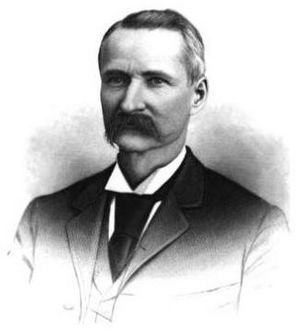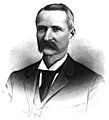William V. Rinehart facts for kids
Quick facts for kids
William V. Rinehart
|
|
|---|---|

State Senator William Rinehart, 1890
|
|
| Member of the Washington Senate from the 19th district |
|
| In office 1889–1890 |
|
| Personal details | |
| Born | 28 December 1835 Clarks Hill, Indiana |
| Died | 16 October 1918 (aged 82) Seattle, Washington |
| Political party | Republican |
| Occupation | Indian agent and businessman |
| Military service | |
| Allegiance | United States |
| Branch/service | Union Army |
| Years of service | 1856; 1862–1866 |
| Rank | Major |
| Unit |
|
| Commands | Fort Klamath |
| Battles/wars | Rogue River Wars and American Civil War |
William Vance Rinehart (born December 28, 1835 – died October 16, 1918) was an American soldier and politician. He served as an officer in the Union Army during the American Civil War. After the war, he became an Indian agent in Oregon. Later, Rinehart moved to Seattle, Washington. There, he became a successful businessman and was active in local and state politics. He was elected to Washington state's first legislature, serving as a state senator from 1889 to 1890.
Contents
William Rinehart's Early Life
William Rinehart was born on December 28, 1835, in Clarks Hill, Indiana. He grew up on a farm and went to Farmer's Institute, a Quaker school. In 1854, when he was 18, Rinehart traveled to California. He crossed the North American plains by driving an ox team.
Once in California, he started looking for gold near Downieville. He later moved north to the Crescent City area and continued to mine for gold.
In 1856, Rinehart moved to Josephine County, Oregon. He mined for gold near Aulthouse Creek. At this time, the Rogue River Wars were happening in southern Oregon. Rinehart joined the local militia. He helped build Fort Briggs, a fort that protected settlers in the Illinois Valley. In 1858, he ran for Josephine County clerk as a Republican, but he lost the election. The next year, he worked as a store clerk in Waldo, Oregon. Rinehart was a strong Republican. He supported Abraham Lincoln in the 1860 presidential election.
Serving in the Civil War
William Rinehart supported the Union cause during the American Civil War. In January 1862, he joined the 1st Oregon Volunteer Cavalry Regiment. He became a first lieutenant and was made the regiment's adjutant. This meant he helped with administrative tasks. In December 1863, he was promoted to Captain. As a captain, Rinehart commanded Company A of the volunteer cavalry regiment. His company was stationed at Fort Walla Walla in the Washington Territory.
After his time with the 1st Oregon Cavalry ended, Rinehart joined the 1st Oregon Volunteer Infantry Regiment. This unit was led by Colonel George Byron Currey. Rinehart served in southeastern Oregon, protecting wagon trains from attacks by Native Americans. In the summer of 1865, Rinehart was promoted to Major. Soon after, he took command of Fort Klamath. He stayed in command until the Civil War ended. Regular Army troops then came to Oregon to replace the volunteer soldiers. Rinehart left the Army in 1866.
Life After the War
During the war, Rinehart married Amanda E. Gaines from Yamhill County, Oregon. They had three children together. After the war, Rinehart moved his family to Grant County, Oregon. He became a partner in a business that sold goods. In 1868, he moved to Canyon City and opened his own general store. The next year, he became Canyon City's postmaster, a job he held for five years. During this time, he continued to support Republican candidates in Grant County. He also ran for a seat in the state legislature but was defeated. In 1874, he moved to Los Angeles, California, but returned to Oregon two years later.
Working as an Indian Agent
In 1876, Rinehart was appointed as an Indian agent at the Malheur Indian Reservation. He held this job until the reservation closed in 1882. The reservation was in a remote part of eastern Oregon, about 50 miles east of Fort Harney. It was mainly home to Northern Paiute people.
Rinehart took over from Samuel B. Parrish, who was well-liked by the Native American people on the reservation. However, Rinehart's time as agent was often difficult. He had many disagreements with the Native Americans living there. Some residents, like Sarah Winnemucca, said he made them give their crops to the government. Then, he would give them government food rations, which was often less than what they had grown. Two important chiefs, Egan and Oytes, also complained about Rinehart's unfair policies. When white settlers let their animals graze on reservation lands, Rinehart did not try to stop them. He even allowed one rancher to cut trees on the reservation without paying for them.
Rinehart's strict policies might have caused some local Paiutes to join the Bannock War in 1878. When the fighting reached the Malheur reservation, Rinehart went to Canyon City. He helped organize the town's defenses there.
After the conflict, some Paiute and Bannock prisoners were held at the Malheur reservation under Rinehart's care. Eventually, all Native Americans at Malheur were moved to other reservations. Rinehart lost his job when the Malheur reservation closed in 1882.
Later Life and Politics
After the Malheur Indian Reservation closed, Rinehart moved to Seattle. In Seattle, he first sold hardware and then opened a grocery store. Later, he started a successful real estate business. He was also very involved in city life. He served on the Seattle city council in 1884 and 1885. In November 1888, he was elected to Washington's territorial legislature. However, Washington became a state before he could take office, so that election was canceled.
In Washington state's first election in 1889, Rinehart was elected as a state senator. He represented District 19, which included King County. This allowed him to serve in the state's first legislative session. This session lasted from November 6, 1889, to March 28, 1890. During this time, Rinehart helped write Washington's first set of laws. He also served in a special session called by the governor in September 1890. In that session, they redrew legislative districts and changed the size of the state House of Representatives and the state senate.
Rinehart did not run for re-election to the state senate when his term ended in 1890. After leaving the state senate, Rinehart became Seattle's first commissioner of public works. Later, he returned to Seattle's city council. He served there for another ten years. During this time, he was often the president of the city council. This meant he acted as mayor when the elected mayor was away.
Rinehart was active in the Washington Pioneer Association, serving as its president in 1896. He was also a well-known Mason. For many years, he was active in several groups for Civil War veterans.
William Rinehart died of pneumonia in Seattle on October 16, 1918. After he passed away, the Washington State Senate honored him with a special resolution. A memorial service was also held for him in the chamber of the Washington state House of Representatives on February 4, 1919.
Images for kids
 | Claudette Colvin |
 | Myrlie Evers-Williams |
 | Alberta Odell Jones |


